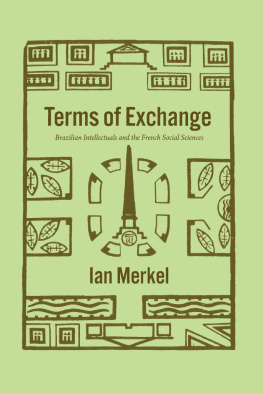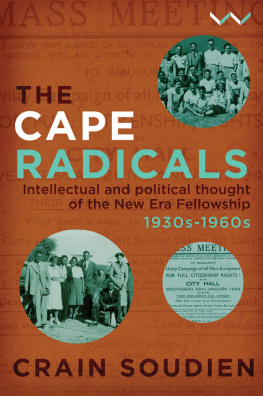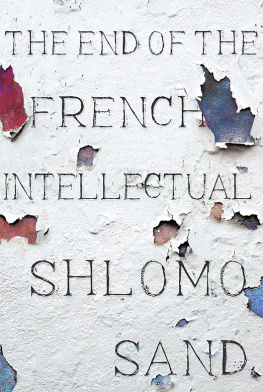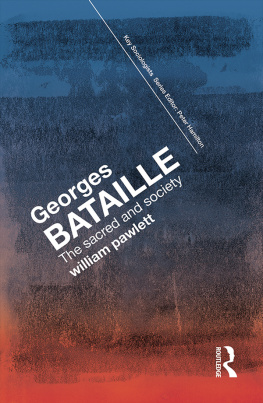Godless Intellectuals?
The Intellectual Pursuit of the Sacred Reinvented
Alexander Tristan Riley
First published in 2010 by
Berghahn Books
www.berghahnbooks.com
2010, 2012 Alexander Tristan Riley
First paperback edition published in 2012
All rights reserved. Except for the quotation of short passages for the purposes of criticism and review, no part of this book may be reproduced in any form or by any means, electronic or mechanical, including photocopying, recording, or any information storage and retrieval system now known or to be invented, without written permission of the publisher.
Library of Congress Cataloging-in-Publication Data
Riley, Alexander Tristan.
Godless intellectuals? : the intellectual pursuit of the sacred reinvented / Alexander Tristan Riley.
p. cm.
Includes bibliographical references and index.
ISBN 978-1-84545-670-2 (hbk.) ISBN 978-0-85745-805-6 (pbk.)
1. Durkheimian school of sociology. 2. Poststructuralism. 3. Holy, The. I. Title.
HM465.R56 2010
301.0943dc22
2010006673
British Library Cataloguing in Publication Data
A catalogue record for this book is available from the British Library
Printed in the United States on acid-free paper.
ISBN: 978-0-85745-805-6 (paperback) ISBN: 978-0-85745-821-6 (ebook)
no biography, no depiction of the growth and development of an intellectual life, could properly be written without taking its subject back to the pupil stage, to the period of his beginnings in life and art, when he listened, learned, divined, gazed, and ranged now afar, now close at hand.
Thomas Mann, Doctor Faustus
Acknowledgements
T wo mentors (or, to use the borrowed terminology I use in this book, two masters of ceremonies) were essential in the completion of the research on which this book is based. Harvey Goldman influenced and shaped it in more ways than I can begin to list. Very simply, this book would not have existed, at least not in this form, if I had not had the tremendous good fortune to come to work with him as a graduate student. He convinced an impetuous and hot-headed young man to settle down and do a little work, no small task. He has also been the most generous of friends. Philippe Besnard encouraged this project during my time digging in the Paris archives and gave tremendous practical aid in finding and accessing many documents. Both Harvey and Philippe shared with me the supreme scholarly gift: honesty. Though they both became my friends as well as my teachers, they unflinchingly let me know when I was talking about things I did not well understand, and they suggested ways to amend the problem. Philippe died, far too early, in 2003, and I greatly regret that he will not be able to read and criticize this book.
Willie Watts Miller and Bill Pickering have long spiritually supported the work on which this book is based. Jeffrey Alexander and Philip Smith also provided encouragement and asked me to submit a chapter for their Cambridge Companion to Durkheim which wound up being a condensed version of the core argument in the book. Ed Tiryakian's Sociologism and Existentialism and Mike Gane's writings on Durkheim, Mauss, and Baudrillard have been a tremendous inspiration and example to me. Ed also shared some very kind words with me over lunch in Montral back in 1998 that I will not soon forget. Marcel Hnaff provided boundless encouragement and enthusiasm, as well as inspiration, for this work.
Thanks to all the archivists at the Collge de France, the Laboratoire dAnthropologie Sociale, and IMEC and to the staff at the Bibliothque Nationale Richelieu and Franois-Mitterrand sites. What a pleasure it has been to work in your facilities and reap the benefits of your expertise.
Thanks also go to Marion Berghahn for her support and patience in the process of getting this into print.
Some parts of the arguments in Chapters have previously appeared in other forms in articles and one book chapter published by Cambridge University Press, the Revue europene des sciences sociales, and the University of California Press.
This book is dedicated to my wife Esmeralda and our daughter Valeria, who are currently engaged in the difficult task of teaching me about the virtue of hope.
1

The Intellectual Pursuit of the Sacred
T he central goal of this book is to map the emergence, trajectory, and influence of a very particular kind of intellectual project that I call mystic Durkheimianism, which unites two seemingly very strange bedfellows: Durkheimian sociology and poststructuralism. An understanding of its existence and influence in the French intellectual world will contribute to a better understanding of some otherwise fairly mysterious facts in intellectual history. Moreover, there are to date no treatments of this important piece of the history of French social theory by a sociologist using sociological terms and tools, and I hope to contribute to the work of filling that considerable hole in the scholarly literature.
A second and closely related goal of the book involves the presentation and test-driving of a research method for thinking about intellectual works and identities. How can we understand the relationship between the work an intellectual produces and his or her life in terms that are not simply biographical? What can we know about how and from what sources intellectual projects arise? How can we hope to understand the meanings of intellectual works and trajectories sociologically without completely jettisoning the experiential level of that production? What can we know about how intellectual influence works? When we construct intellectual histories and thereby try to make some sense of who goes where, what are the criteria we should use? What ultimately are the things we need to account for in understanding intellectual production and the meaning of ideas and intellectual work? These are some of the questions I will address, and a serviceable theory of the intellectual habitus, intellectual experience and identity, and intellectual production, empirically derived and tested in this particular site of twentieth-century France, is what I hope to work toward in the pages that follow.
Both Durkheimian sociology and French poststructuralist thought have received considerable attention in the French- and English-speaking academic worlds over the past fifteen to twenty years. Significant literatures now exist on the histories of both, though connections between the two are only infrequently and unsystematically explored. Historical work on the Durkheimian school frequently finds its sources in nineteenth-century French neo-Kantianism and traces its influence through contemporary forms of functionalism and sociological positivism. The work on the possible meanings and usages of poststructuralism has brought with it a concern for establishing the genealogy of this peculiar branch of literary and social theory. Various theses connect it to the broader anti-humanist and structuralist movements that originated in linguistics, to the peculiar French reading of Nietzsche by the literary avant-garde, or to the anti-Marxist left intellectual radicalism associated with the political and cultural upheaval of May 1968.









